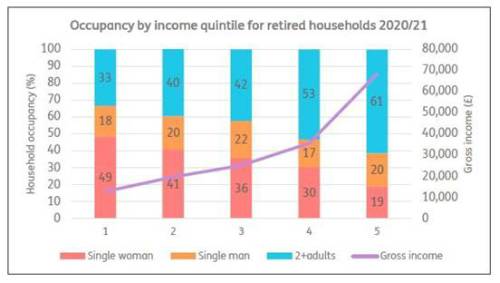Nearly half of retired households in the lowest income group are made up of women living alone, analysis of official figures by retirement specialist Just Group has found.
Splitting households into five groups (quintiles) by annual income shows that single women make up nearly half (49%) of the 1.7 million households in the bottom quintile where gross annual income is £12,706. Single men make up 18% and the remaining third (33%) are couples or homes with two or more adults.
Only in the highest income quintile – where gross annual household income is £68,429 – is there greater representation of single men (20%) compared to single women (29%) but the majority (61%) are couples.

Stephen Lowe, group communications director at Just Group, said: “There are about 4.2 million households composed of a single person aged over 65 which is about a million more than 25 years ago.
“Low-income pensioner households are nearly three times more likely to be single women as single men. While the proportion of single male households stays relatively stable at about one in five across all income groups, for single women it falls from nearly half among the lowest income group to about one in five of the highest income group.
“It’s a concern because many household costs such as insurance, utilities and home maintenance are nearly as high for single people as for couples, so the fact so many retirees on the lowest incomes live on their own in their own homes suggests they must be feeling the rising cost of living in their pockets.
“The figures strongly reinforce the view that women don’t do as well in retirement as men. Our past research has shown women who retired earlier than expected were more likely than men to leave the workforce due to ill health (37% of women v 29% of men), three times more likely to leave the workforce to care for a family member (14% v 4%), and nearly half as likely to retire due to feeling their pensions were sufficient (16% v 29%).
“These single retirees are not necessarily elderly widows – this lowest income group is on average a little younger than the other income groups and more likely to be under State Pension Age which suggests finding jobs may be a problem.”
He said that the lowest income group also does not receive the most in State Pension and other benefits as the other households which may reflect the fact that a high proportion are composed of single people rather than couples who may receive two State Pensions.
Home ownership is relatively high among this lowest income group too at 79% which is significantly higher than the second quartile (66.6% home ownership) where average gross incomes are 50% higher at £19,595 and the middle quartile (69.3% home ownership) where gross incomes are twice as high at £25,082.
“We would urge all those struggling on low incomes to first check their entitlement to State benefits,” said Stephen Lowe.
“Government figures show about 850,000 households are missing out on £1.7 billion of Pension Credit each year, or about £1,900 each.”
Research from Just Group’s sister company, HUB Financial Solutions, found that nearly half of over 65s who own their home (46%) said they have never checked their benefit entitlement. Two in five (39%) of these said they assumed the value of their home meant they would not qualify so didn’t check.
“Home ownership also creates the possibility of using the wealth tied up in the home to support retirement income. This is a more complex area of financial services that will require professional advice and careful analysis of the pros and cons.
“But today’s lifetime mortgages are helping many ‘property rich, income poor’ households who have benefited from rising house prices over their working lives to enjoy a higher standard of living in retirement.”
There are a range of resources to help people check their entitlement to benefits:
• The government highlights free, independent third-party benefit calculators at https://www.gov.uk/benefits-calculators
• MoneySavingExpert also have a benefits calculator: https://www.moneysavingexpert.com/family/benefits-check/
• Local councils provide information on financial help to pay rent or Council Tax
• Organisations such as the Government’s Money Helper Service and charities such as Citizens
Advice and Age UK can be good sources of assistance.
• Professional advisers will charge but can provide regulated advice alongside information about benefit eligibility
|

